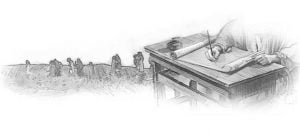9: Trials, Tribulations and Lists-Teaching Plan
Key Thought: No matter how far away we are from God he can bring us back to Him.
November 30, 2019
-
Have Volunteers to read Daniel 1:1-2 and Ezra 1:9-11.

Image © Pacific Press
- Ask the class what seems to be the theme of these passages.
- What is the significance of the returned items?
- Personal Application: If God had the Jews keep an accurate track of items, what assurance does that give that God will keep an accurate track on you and your life? See John 17:10-12 and Deuteronomy 3:3.
- Case Study: Your skeptical neighbor who has trouble believing the accuracy of the Bible points out that if you add up the items in Ezra 1:9-10 it only adds up to 2,499. That is 2,901 items short of the ,5400 total. How do you explain this? Hint: Some scholars believe the 2,499 total is only what Sheshbazzar returned adding to what others returned making the 5,400 total. Some scholars believe there is a translation error. While many scholars agree with the former explanation, suppose such a translation error did exist. Should that make us distrust the Bible? Consider: ““I saw that God had especially guarded the Bible, yet when copies of it were few, learned men had in some instances changed the words, thinking that they were making it more plain, when in reality they were mystifying that which was plain, by causing it to lean to their established views, which were governed by tradition. But I saw that the Word of God, as a whole, is a perfect chain, one portion linking into and explaining another. True seekers for truth need not err; for not only is the Word of God plain and simple in declaring the way of life, but the Holy Spirit is given as a guide in understanding the way to life therein revealed.”—Ellen White, Early Writings, Pages 220, 221
2. Have a volunteer(s) read Daniel 5:1-31.
- Ask the class what is the main point of this passage.
- What lesson should Belshazzar have learned from his predecessor Nebuchadnezzar?
- Personal Application: What lessons do we have to learn from Belshazzar? We often draw comfort from passages that describe God’s love and acceptance of all humanity, but should we also heed passages like Daniel 5:26-27? See also Revelation 3:17.
- Case Study: A member of your Bible study group points out in Daniel 5:13-14 it appears Belshazzar gives Daniel a backhanded compliment. He refers to him as an exile instead of one of the kings royals servants. Does Daniel seem phased by this insult? Why or why not? What example does Daniel give us when we appear to be underappreciated or belittled?
3. Have a volunteer read Deuteronomy 30:1-6.
- Ask what is the main idea in this passage?
- What was the prerequisite for having their fortunes restored?
- Personal Application: What hope does verse 4 give us when we stray far from God?
- Case Study: Another friend from your Bible study group says he sees some similarities between the Jews returning to Jerusalem and the story of the prodigal son. What parallels do you find in the parables in Luke 15:1-31 with the Jews returning home ?
4. Have a volunteer read Nehemiah 11:1-2.
- Ask what is the main idea of this passage?
- What do “sacred lots” (NLT) tell us about how carefully God chooses where we live?
- Personal Application: How much influence does your home environment have on your personal walk with God? Does God take into account where we were born and what influences we had where we lived? See Psalm 87:6.
- Case Study: Your Adventist friend, who lives in an Adventist university community, tells you he is moving to a town where there are no Adventist churches. He hopes to start a small home study group that may grow into a church. He feels he will be needed more where there are not already a bunch of Adventists. Another Adventist friend tells you he wants to move to an Adventist community because he feels more comfortable being where everyone believes the same way. Which friend do you encourage the most and why?
Conclusion: Encourage your class to share this message with someone this week. Remember, “Truth that is not lived, that is not imparted, loses its life-giving power, its healing virtue. Its blessings can be retained only as it is shared.”Ministry of Healing, p. 148
